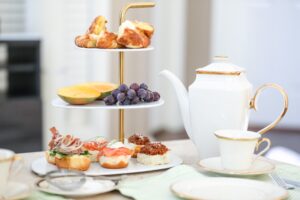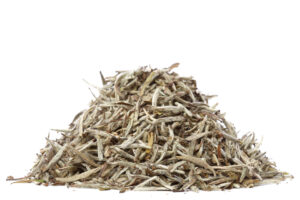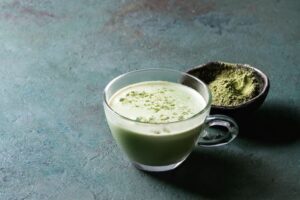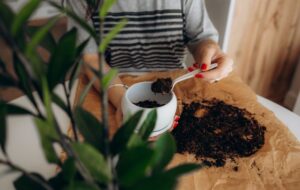The term “milk tea” can cover a broad range of tea-based beverages throughout the globe. In its simplest form, it is a cup of tea mixed with milk or cream. However, the method of preparation varies significantly. Milk and a sweetener (mainly sugar) are commonly added to lessen the tartness and produce a more smooth flavor.
It is also sometimes referred to as bubble tea or boba because of the tapioca balls found in the bottom of the drink. You can have the beverage either hot or cold, depending on your preference.
Many prominent chains like Gong Cha have been operating for a long time, but small businesses are also springing up left and right. Nowadays, it is a staple drink — especially for the younger generation. The milk tea craze has swept over the world in full force. People are strolling the streets with cups full of tapioca pearls and colorful straws in their hands.
Because the beverage consists of tea, it contains caffeine. Caffeine levels in a typical cup range from less than 100 mg to 160 mg. As a result, it may contain a significant dose of caffeine. However, the quantity of caffeine depends on the amount and type of tea used as the base.
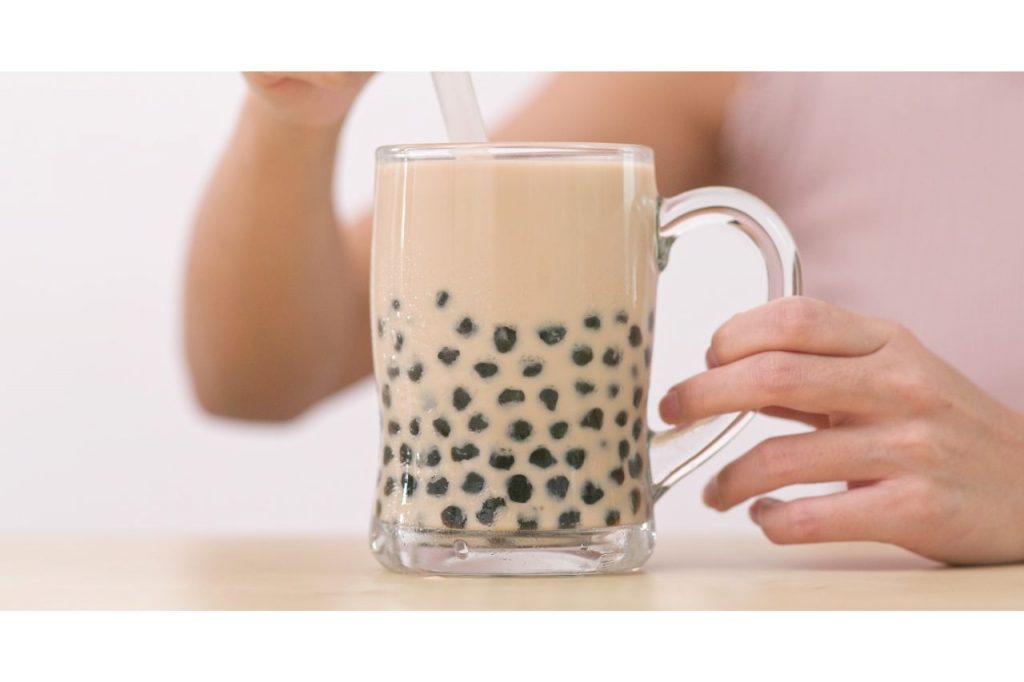
What Are The Types of Tea Used In Milk Tea?
Black Tea
Black tea is by far the most commonly used tea. In most milk tea shops, you’ll find Assam black tea in your cup of milk tea. Black tea is a common ingredient in flavors like Pearl Milk Tea, Black Milk Tea, and Hong Kong Milk Tea.
Black tea adds a rich tea taste that complements the other ingredients in your drink. Unlike the other teas on this list, it offers a flavor that can’t be overshadowed.
Jasmine Tea
Another common tea base is jasmine tea. Compared to black tea, jasmine tea has a lower caffeine content.
The caffeine content in a standard cup of jasmine tea is often between 20 and 30 milligrams. A jasmine tea-based milk tea is an excellent choice if you’re intolerant to caffeine or don’t want to consume a lot of it in your milk tea.
Oolong Tea
Caffeine content is relatively low in oolong tea as well. It’s likely to contain the same amount of caffeine as jasmine tea.
Caffeine levels in oolong tea tend to range between 25 and 35 milligrams. This measurement depends on the brand, the brewing temperatures, and other variables.
Green Tea
This is one of the most popular tea bases. Green tea, like other teas, contains caffeine. However, the effects of the stimulant are more gradual than those of other tea bases. Green tea is perfect for those who don’t want a rapid caffeine crash.
An average cup of green tea has around 20-30 milligrams of caffeine.
Is Milk Tea Healthy?
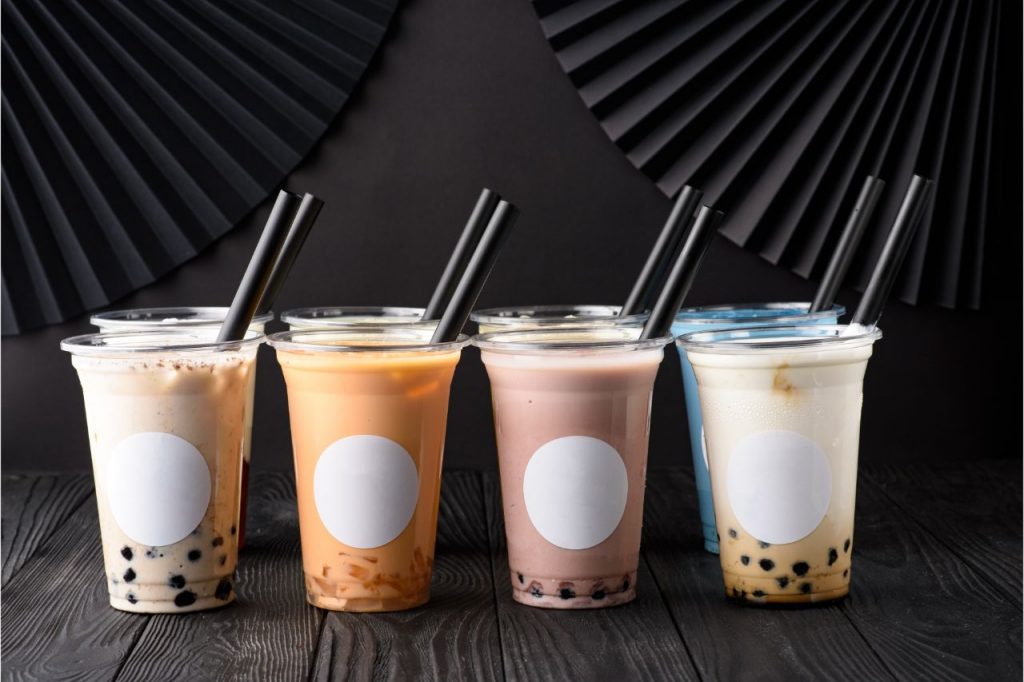
Milk tea’s health benefits have long been a source of controversy. It has a lot of sugar and isn’t the healthiest option. However, this increasingly popular beverage has been studied for its potential health advantages as they are attributed to tea.
But, if you were to ask if milk tea is healthier than traditional tea? Then, it’s a big NO. Carbohydrates are abundant in milk tea. Empty carbohydrates, such as refined sugar, make up most of the beverage. A single big cup of bubble tea may contain 50 grams of sugar and about 500-600 calories.
But keep in mind that some bitter chemicals contained in tea are incredibly helpful to health. So if you’re having tea to enhance your health, it’s better to drink it without milk, sugar, and crazy toppings!
Free Radical-Fighting Properties
Flavonoids, which are abundant in green tea, could be useful for the body to combat free radicals.
Moreover, catechins abound in black tea. As antioxidants, they could help decrease blood pressure and relax the nervous system.
However, it’s crucial to remember that green and black teas contain caffeine. Even though they might boost productivity, you should consume them in moderation.
Bone-Forming Nutrients
In many countries, milk tea shops make the beverage with either fresh milk or condensed milk. Even though some individuals are lactose intolerant, can be a source of calcium and potassium.
Caffeine Content in Milk Tea
Caffeine content depends entirely on the tea base and the size of the cup you purchase. However, the majority contain significantly less caffeine and are often under 100 calories for a regular-sized cup.
But, you shouldn’t take this lightly. It still includes a hefty dose of stimulants and can potentially give children a sugar (or sometimes batty) rush.
In comparison to a typical cup of coffee, the caffeine concentration isn’t nearly as high. But, the combination of caffeine and sugar has a compounding impact on its consumers.
How to Order A Healthier Milk Tea
Since this beverage has grown, you can easily customize your selections. Some shops even allow you to have complete control over the steeping time.
There are several ways to tailor your purchase to meet your lifestyle preferences, including the addition of caffeine. If you want a beverage with lesser sugar, no sweetener, or dairy-free, there are a variety of choices available.
No matter how you get your fix, you can relax knowing that neither your child nor you are taking excessive amounts of caffeine, regardless of whether you make it yourself or purchase it. When consumed in moderation, antioxidants may provide several health advantages.
How Much Milk Tea Consumption is Safe?
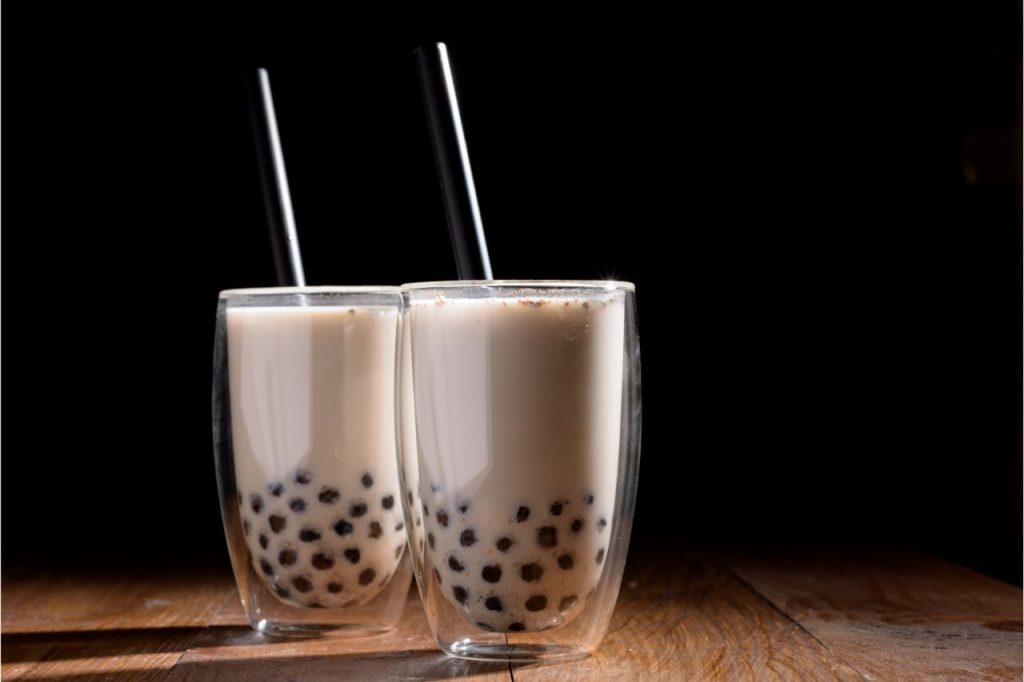
Drinking 1-2 cups of tea per day is safe for most individuals, but some may have negative effects at lower dosages. Tea’s caffeine and tannin concentrations are responsible for the majority of its recognized adverse effects. Consumption of more than 150 ml of milk tea daily could put one at risk for anxiety-inducing effects.
Can Children Drink Milk Tea?
If your children are curious about or already like bubble tea, a single serving is acceptable. There are some things to bear in mind, though.
Milk tea contains caffeine since it is brewed with tea and consumed in large servings. Bubble tea provides 130mg of caffeine in a 13-ounce cup.
It’s perhaps more of a dessert than a nutritious pot of tea. It’s not unusual for the largest cup of bubble tea to contain more than 500 calories, which is approximately a third of what a small kid needs in a day for a healthy diet.
So, if your child wants something, customize the drink if possible. You can also order milk tea in the smallest size.
Can Pregnant Women Drink Milk Tea?
Pregnant women should talk to their doctor about whether or not they should be concerned about ingesting too much caffeine while pregnant.
Final Thoughts
If you order a standard milk tea, you’re almost always getting tea (unless indicated otherwise.) Avoid milk tea and tea-based drinks if you’re trying to cut down on your caffeine intake. In general, caffeine shouldn’t be a concern until you consume excessive quantities (and if you have complications upon consuming sugar and caffeine.)
Fruit teas and matcha-based beverages are equally delicious options and alternatives.
Happy Sipping!


